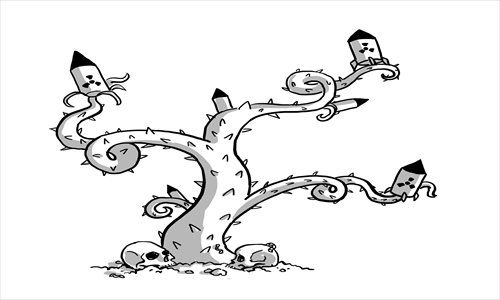North’s threat stirs up nuclear fantasies in SK

Pyongyang's third nuclear test and its threatening note of "precise nuclear attacks" on Seoul are casting a subtle shadow over the South Korea-US alliance, which will soon mark its 60th anniversary.
Although Pyongyang's nuclear intimidation is likely to be just bullying rhetoric, there are growing voices in South Korea for the redeployment of tactical nuclear weapons and even in favor of the South developing nuclear weapons on its own.
Of course, the South has sufficient reasons to be anxious regarding the nuclear threat from the North. However, Washington does not seem in the least concerned with Seoul's anxiety about nuclear threat.
What's worse, it seems that the US is tacitly accepting the North's nuclear weapons as a fait accompli, and is poised to shift its policy toward stopping the proliferation of Pyongyang's nuclear and missile technologies to Iran and Syria.
This gap of threat perceptions between the US and South Korea is causing delicate repercussions in their alliance politics.
The Mutual Defense Treaty between the US and South Korea signed in 1953 has served as a US dual containment instrument against the Korean Peninsula: a deterrent against a North Korean attack on the South and also a restraint on Seoul's military action against Pyongyang.
In particular, the US restrained South Korea from developing its indigenous nuclear weapons program in the 1970s, especially by giving Seoul assurance that the US would not unilaterally withdraw its troops from South Korea.
In short, maintaining US defense commitments, including extended nuclear deterrence, has contributed to South Korea's decision not to go nuclear.
However, as North Korea's nuclear threat is increasingly becoming a reality, a tacit agreement on nuclear issues between South Korea and the US is showing signs of crack.
Despite the fact that the US goes to great lengths to assure Seoul of its continued conventional and nuclear commitment to its security, there is skepticism in the South as to whether US nuclear assistance would be forthcoming in a time of real crisis.
A significant number of South Koreans, including high-level officials, seem to believe that the return of tactical nuclear weapons would help to fill this perceived threat gap.
Nevertheless, reintroducing tactical nuclear weapons on a tit-for-tat basis against the North could cause the aggravate security dilemma. The US is also allegedly against this idea.
The latest reports say that the US submarines equipped with nuclear weapons will stay in South Korean waters for the time being to fully guarantee South Korea's shelter under the US nuclear umbrella in case of North Korean attacks.
Of course, this could provide considerable comfort for South Korea. However, the US nuclear umbrella is designed for strategic purposes, not for dissuading the sinking of a frigate or the shelling of offshore islands.
South Korea has become subject to lower-level provocation from the North, rather than a major nuclear war.
Therefore, it remains highly unlikely that the US will decide to use nuclear weapons on South Korea's behalf.
From the perspective of regional nuclear order, the argument that Seoul must develop its own nuclear weapons is also very dangerous.
To do so, Seoul would have to abandon the Treaty on the Non-Proliferation of Nuclear Weapons. In that case, the US and the international community would lose their leverage to stop the nuclear developments of North Korea and Iran.
Seoul would thus be isolated in the global community, and would probably have to endure economic sanctions.
Furthermore, nuclear armament by South Korea could lead to provocative nuclear development from countries and regions like Japan and Taiwan.
At present, the most serious threat of war in the 19 years since the 1993-94 nuclear crisis is hanging over the Korean Peninsula.
Judging by the rhetoric coming out of Pyongyang, it would not be overstating matters to say that the area stands poised at the brink of war.
At this juncture, the prime need is to stabilize the situation so that an armed clash does not take place between two Koreas.
The South Korea-US alliance must serve as a stabilizing factor, just as it did before. Cold War tit-for-tat solutions will never be enough to bring peace to the Korean Peninsula.
The author is a professor with the Asiatic Research Institute of Korea University. opinion@globaltimes.com.cn